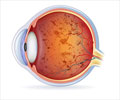Scientists from Johns Hopkins University used gene therapy to restore hearing loss from Usher syndrome, providing a promising new method of treatment.
- Scientists from Johns Hopkins University studied the effect of gene therapy on hearing loss
- This is the first study to analyze the effect of gene therapy on Usher syndrome induced hearing loss
- The study showed improved hearing and balance after gene therapy
Dizziness and Hearing Loss among the Elderly
Many elderly people suffer from dizziness and imbalance. A population-based study conducted in the United States shows that among people who are older than 72 years, 24% suffer from dizziness. Dizziness among the elderly is a cause for concern among caregivers, as well as to society, as they are prone to falls or accidents. The consequent risk of injuries is the prime reason for hospital admission as well as accidental death. There is an increased fear of falling associated with dizziness, which affects the emotional health of the individual.There are changes in the balance system of the body, whether it is sensory, visual, neurologic, or even muscular in origin. The functions of these systems tend to deteriorate with advancement in age. Statistics from the Centers for Disease Control reveal that in the United States, one in three people aged between 65 and 74 years have hearing loss, with almost half of those older than 75 years finding it hard to hear. Women are found to be less likely to develop loss of hearing when compared to men.
Usher Syndrome
This is one of the most common reasons for loss of hearing and vision when they occur together. The symptoms associated with Usher syndrome include retinitis pigmentosa and hearing loss. Retinitis pigmentosa leads to night blindness with a loss of peripheral vision. As the vision loss progresses, it leads to a tunnel vision, where only central vision remains. People diagnosed with Usher syndrome have balance problems. The three types of Usher syndrome are type 1, type 2, and type 3. Types 1 and 2 are most common.Gene Therapy for Usher Syndrome
Neuro-otologist and associate professor of the Head and Neck Surgery team at Johns Hopkins University, Dr. Wade Chien, who is the principal study investigator and his team, studied the effect of gene therapy on genetically modified mice with Usher syndrome. The scientists analyzed the effect of gene therapy provided to the inner ear of these mice which carried the mutation for Usher syndrome. The mice showed classical symptoms of Usher syndrome with difficulty in balance and absence of hearing, from birth.
The study on gene therapy showed that
- There was restoration of balance among the genetically modified mice.
- There was improvement in hearing.
- This was the first study to utilize gene therapy to improve hearing and balance function among mice.
D S Williams and colleagues from the University of California in Los Angeles (UCLA) used gene therapy for retinal degeneration in Usher syndrome. The main aspect of gene therapy for these patients lay in early identification of patients, prior to significant retinal damage. While most forms of retinal degeneration are detected only after there has been significant vision loss, in types 1 and 2 of Usher syndrome, the presence of congenital deafness allows identification of the condition. While deafness is treated with cochlear implants, gene therapy could be used for retinal degeneration. Gene therapy studies were carried out on Usher genes using lentiviral (LV) method of transport of MYO7A, the gene which is associated with the development of Usher syndrome 1B (USH1B).
The research shows that this method of treatment holds a lot of promise and will provide patients with a new line of therapy. Current treatment methods for Usher syndrome include strategies that prevent further deterioration of vision and hearing; but there is no method available to restore the failing faculties. Such studies will help in identifying a method of treatment which could restore vision and hearing loss.
References:
- Usher Syndrome - (https://www.nidcd.nih.gov/health/usher-syndrome)
















